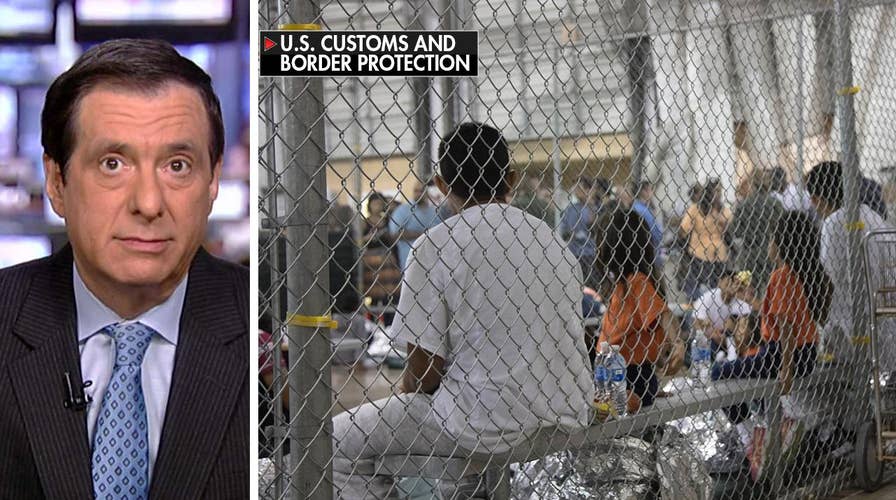Kurtz: How images of crying children turned the tide
'MediaBuzz' host Howard Kurtz weighs in on how President Trump is losing the GOP and his media allies due to an outcry over separating immigrant families.
A Republican president has a problem when he's lost the New York Post.
And religious leaders who have backed him on just about everything he's done.
And the last Republican first lady.
And his own wife feels compelled to speak out.
That's where Donald Trump is right now on the practice that has separated nearly 2,000 children from their parents at the border, warehousing them in converted stores and buildings.
In the face of a tsunami of critical media coverage, some of Trump's own allies are breaking with him on this one. And here's why.
The immigration debate is fraught with complexity, with arguments about border security, chain migration and building a wall on one side and about protecting the "Dreamers" brought here as kids on the other.
But there is nothing complicated about the heart-rending images of children, some of them babies and toddlers, being seized from their parents. The pictures are searing, and they are offensive to a great many Americans.
Even the president says he hates seeing the kids taken away. He said yesterday the family separations are "so sad" and again called on the Democrats to make a deal.
But that leads to the second reason why this sad spectacle is so politically damaging for him. Trump keeps insisting that he has no choice, that his administration is following the law, and that it's the Democrats' fault for not reaching an immigration compromise.
The great majority of journalists, fact-checkers and independent experts who have looked at the situation say that's not true. The practice is based on a policy that Trump could change today. Reporters are out-and-out accusing him of lying.
There is video of Jeff Sessions, a few months ago, announcing the new "zero tolerance" policy, and explicitly warning that children may be taken from their parents. White House adviser Stephen Miller called it "a simple decision by the administration to have a zero tolerance policy for illegal entry, period" in a New York Times interview last week.
The president says he's not using the separation of children as leverage to get a better deal on immigration legislation. But the appearance is very different.
Such pressure tactics are common in legislative horse trading, but the family separations are now widely viewed as beyond the pale. Homeland Security chief Kirstjen Nielsen isn't getting much traction for accusing the press of "irresponsible and unproductive" misreporting.
CBS's Gayle King said the Border Patrol objected to the terminology that the kids are being kept in "cages" but said the word isn't inaccurate.
And Fox's Judge Andrew Napolitano yesterday ripped the policy as "child abuse."
Some Trump supporters defend the practice as a deterrent, meaning that illegal immigrants would be less likely to try to cross the border, or apply for asylum, if they know they might lose their children. That may well be true. But the pictures of crying kids have proven toxic.
In a rare policy statement, Melania Trump said she "hates to see children separated from their families and hopes both sides of the aisle can finally come together," and "believes we need to be a country that follows all laws, but also a country that governs with a heart."
Laura Bush, in a column for The Washington Post, wrote: “I live in a border state. I appreciate the need to enforce and protect our international boundaries, but this zero tolerance policy is cruel. It is immoral. And it breaks my heart."
And there were these strong words in an editorial in Rupert Murdoch's New York Post:
"It's not just that this looks terrible in the eyes of the world. It is terrible: at least 2,000 children ripped from their parents' arms, sometimes literally, in just the first six weeks."
Anthony Scaramucci, the Trump loyalist and former communications director, told CNN about his former boss: "He's got to step in there and end this thing because I think it's an atrocious policy, it's inhumane, it's offensive to the average American. It does not represent American values."
The U.S. Conference of Catholic Bishops has denounced the policy, and the Rev. Franklin Graham, a Trump supporter who called the Stormy Daniels allegations "nobody's business,” said the family separations are "disgraceful."
I have deliberately focused here on the outcry among those who are usually strong supporters of the 45th president. Democrats and other detractors have gone even further in their language, some even using Nazi analogies. But it is far more unusual for Republicans and Trump acolytes to turn on their man.
The president is entitled to fight for his immigration stance, which he spelled out during the campaign. But the situation involving children seems to be a major miscalculation. And it's hard to imagine that the policy will last much longer without some kind of face-saving deal.





